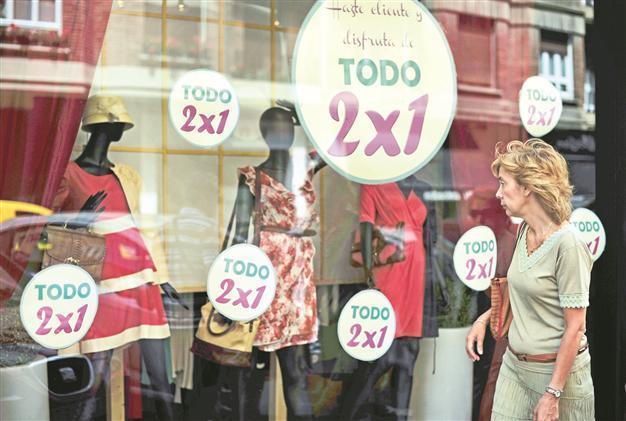Euro falls to 12-year low against yen amid rising Spanish worries
TOKYO - Agence France-Presse

A woman looks at a store announcing low prices, in Pamplona, Spain. The Spanish economy shrank 0.4 pct in the second quarter. AP photo
The
euro tumbled below 95
yen for the first time in almost 12 years yesterday as dealers rushed to the safe-haven Japanese unit owing to growing fears about Spain’s debt crisis. The new figure came amid new negative data from Spain.
The common currency dipped as low as 94.24 yen in afternoon Asian trade -its lowest level since November 2000- from 95.38 in New York trade on July 20.
It was changing hands at 94.44 yen yesterday. Investors must be ready for the euro’s fall below 93 yen this week if it slips below $1.18, said Atsushi Hirano, senior trader at Royal Bank of Scotland in Tokyo. “We don’t have much important economic indicators this week, so we’ll pay attention to stock prices and headlines related to European debt problems,” he said. The euro was also weak against the dollar, trading around two-year lows at $1.2103, while the dollar bought 78.03 yen.
The euro fetched $1.2152 in New York trade on July 20 while the dollar was at 78.48 yen.
Strong yen hurts exportsThe Japanese currency, which hit record highs against the dollar last year, has been increasingly viewed as a safe-haven amid worries about
Europe and a lumbering U.S. economic recovery. But the strong currency has taken a toll on Japan’s exporters by making their products pricier overseas while shrinking the value of their foreign income.
Officials in Tokyo have repeatedly warned that the yen was overvalued and previously intervened in forex markets in a bid to temper the unit.
“As I’ve been saying, I will take decisive steps against speculative movement of excessive volatility,” Japanese Finance Minister Jun Azumi told reporters.
“As far as the current situation is concerned, I’m watching it carefully,” he said in Tokyo yesterday.
Also yesterday, the government said the Japanese economy faces growing downside risks stemming from the European debt crisis, adding that it was increasingly concerned about the outlook for the nation’s export sector.
Meanwhile, Spain’s economic slump deepened in the second quarter of 2012 as consumers cut back spending, the bank of Spain said yesterday. Gross domestic product shrank 0.4 percent in the second quarter from the previous three months, after contracting 0.3 percent in the first, the central bank said in its latest monthly bulletin.
However, Spain does not need a full bailout, the economy minister said yesterday.
Asked by journalists if he ruled out the possibility of a full bailout, after a 100 billion euro EU deal on the banks was agreed on July 20, Luis de Guindos said: “Of course.” “In this period of uncertainty, of volatility, there is an irrational atmosphere (on the markets),” de Guindos said.
Borrowing costs rise again
MADRID – Agence France-Presse
Spanish long-term borrowing costs jumped to record highs yesterday as investors turned increasingly skeptical about government efforts to stabilize a stricken banking system and the public finances.
In early trade, the yield -- the rate of return -- on the benchmark Spanish 10-year government bond jumped to 7.343 percent from 7.225 percent on July 20, well above the 7.0 percent danger level for long-term funding.
The Madrid stockmarket fell sharply at the opening, losing about 2.0 percent after it slumped nearly 6.0 percent on July 20. Other European markets were lower yesterday and borrowing costs for other struggling eurozone states also were under pressure as the debt crisis returned with a vengeance despite an EU bank rescue deal for Spain earlier this month. The Spanish government recently announced massive spending cuts and other measures to stabilize its public finances.
cirisis,
